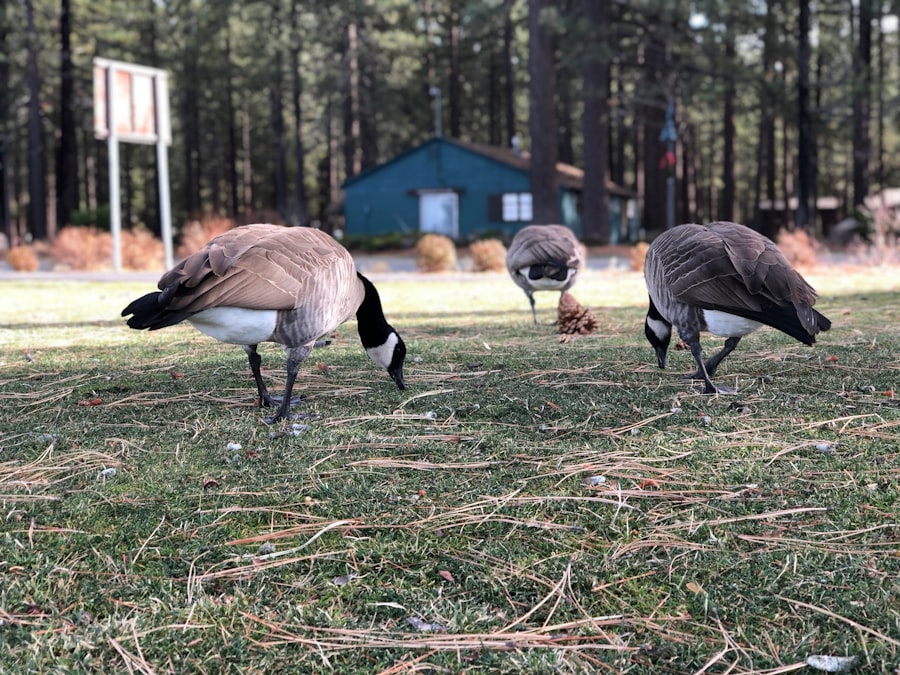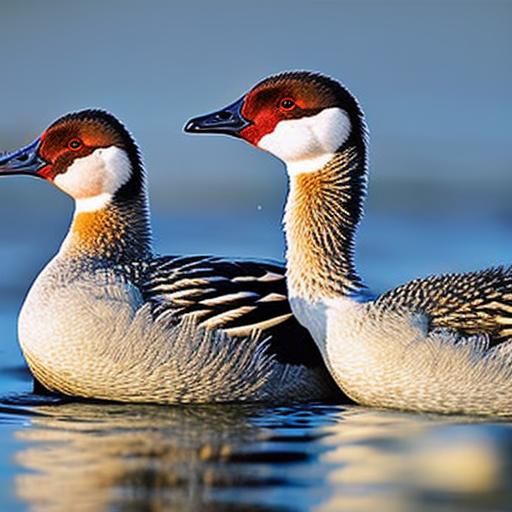Keeping geese as pets or livestock can be a rewarding and fulfilling experience. Geese are intelligent and social animals that can provide many benefits to their owners. Personally, I have had the pleasure of keeping geese on my farm for several years and have found them to be a valuable addition to our homestead.
Key Takeaways
- Keeping geese can be a rewarding experience as pets or livestock.
- Geese can provide natural pest control and fertilization for gardens and farms.
- Noise and mess are common cons of keeping geese.
- Geese can produce high-quality meat and eggs.
- Potential aggression towards humans or other animals is a con to consider when keeping geese.
- Geese are low maintenance and hardy animals.
- Predators can pose a threat to geese.
- Geese have unique and entertaining personalities.
- Zoning and legal restrictions may limit the ability to keep geese in some areas.
- Consider the pros and cons before deciding whether to keep geese.
Pros of keeping geese: natural pest control and fertilization
One of the major advantages of keeping geese is their ability to control pests in gardens and fields. Geese are natural grazers and will happily munch on grass, weeds, and insects. They can help keep your garden or field free from unwanted pests such as slugs, snails, and grasshoppers. This natural pest control can save you time and money on chemical pesticides.
Additionally, geese produce excellent fertilizer with their droppings. Their manure is rich in nutrients and can be used to fertilize plants and improve soil quality. It is a natural and organic way to nourish your garden or crops. By keeping geese, you not only benefit from their pest control abilities but also from the valuable fertilizer they provide.
Cons of keeping geese: noise and mess
While geese can be beneficial, they do come with some drawbacks. One of the main concerns is the noise they produce. Geese are known for their loud honking, especially when they feel threatened or are trying to communicate with other geese. This can be disruptive if you live in a residential area or have close neighbors.
In addition to the noise, geese can create a mess with their droppings and feathers. They have a tendency to leave droppings everywhere they go, which can be unsightly and require regular cleaning. Their feathers also shed regularly, adding to the mess. If you are someone who values cleanliness and tidiness, this may be a downside to keeping geese.
Pros of keeping geese: high-quality meat and eggs
One of the major benefits of keeping geese is the high-quality meat and eggs they produce. Geese meat is known for its delicious flavor and tenderness. It is leaner than other poultry meats and has a unique taste that many people enjoy. Geese eggs are also larger than chicken eggs and have a rich, creamy yolk. They are highly prized by chefs and bakers for their superior taste and texture.
By keeping geese, you have a sustainable source of meat and eggs right in your backyard. You can raise them for personal consumption or even sell them to local markets or restaurants. The high-quality products that geese provide can be a valuable addition to your homestead or farm.
Cons of keeping geese: potential aggression towards humans or other animals
While geese can be friendly and sociable, they also have the potential to be aggressive towards humans or other animals. Geese are protective by nature and will defend their territory if they feel threatened. This can include hissing, biting, or even attacking with their wings.
It is important to handle geese with care and respect their boundaries. If you have small children or other pets, you need to be cautious when introducing them to your geese. Proper training and socialization can help minimize any aggressive behavior, but it is still something to consider when deciding whether to keep geese.
Pros of keeping geese: low maintenance and hardiness

Geese are relatively low maintenance compared to other livestock animals. They are hardy creatures that can withstand cold temperatures and harsh weather conditions. They have a thick layer of down feathers that insulate them from the cold, making them well-suited for colder climates.
In terms of care, geese require access to fresh water for drinking and bathing, as well as a balanced diet of grass, grains, and vegetables. They are excellent foragers and can find much of their own food if given access to a pasture or field. They also require shelter to protect them from extreme weather conditions and predators. Overall, geese are a low-maintenance option for those looking to keep livestock.
Cons of keeping geese: susceptibility to predators
While geese are hardy animals, they are also vulnerable to predators. Foxes, coyotes, raccoons, and even dogs can pose a threat to geese. It is important to provide them with adequate protection and secure fencing to keep them safe from potential predators.
Geese should be housed in a secure coop or pen at night to protect them from nocturnal predators. During the day, they should have access to a fenced-in area that provides them with enough space to roam and graze while still keeping them safe. It is crucial to regularly inspect the fencing and make any necessary repairs or upgrades to ensure the safety of your geese.
Pros of keeping geese: unique and entertaining personalities
One of the joys of keeping geese is their unique personalities and entertaining behavior. Geese are highly social animals that form strong bonds with their owners. They can recognize individual people and will often greet you with excitement and affection.
Geese also have a playful side and enjoy splashing in water, chasing each other, and exploring their surroundings. They can be quite comical to watch and provide endless entertainment. If you are looking for a pet or livestock animal that will bring joy and amusement to your life, geese are an excellent choice.
Cons of keeping geese: zoning and legal restrictions in some areas
Before deciding to keep geese, it is important to check your local zoning laws and regulations. Some areas have restrictions on the number of geese you can keep or may prohibit them altogether. It is crucial to familiarize yourself with these regulations to avoid any legal issues or fines.
If you live in a residential area or have close neighbors, you may also need to consider their preferences and concerns. Geese can be noisy and messy, which may not be suitable for all neighborhoods. It is important to be respectful of others and ensure that keeping geese aligns with the rules and expectations of your community.
Conclusion and considerations for deciding whether to keep geese
In conclusion, keeping geese as pets or livestock can be a rewarding experience. They offer natural pest control, high-quality meat and eggs, low maintenance care, and unique personalities. However, it is important to consider the potential noise, mess, aggression, susceptibility to predators, and legal restrictions associated with keeping geese.
When deciding whether to keep geese, it is essential to evaluate factors such as available space, time commitment, and available resources. Geese require adequate space to roam and graze, regular care and attention, and protection from predators. It is also important to ensure that keeping geese aligns with your local regulations and community expectations.
Based on my personal experience, I highly recommend considering keeping geese as pets or livestock. They have brought joy, entertainment, and valuable benefits to my farm. With proper care and attention, geese can be a valuable addition to any homestead or farm.
If you’re considering keeping geese, it’s important to weigh the pros and cons before making a decision. One related article that can provide valuable insights is “Hannah Montana Chicken Coop” from Poultry Wizard. This article discusses the benefits and drawbacks of keeping chickens in a specific type of coop, which can be applicable to geese as well. To learn more about the advantages and disadvantages of keeping geese, check out this informative article: Hannah Montana Chicken Coop. Additionally, if you’re interested in breeding chickens and want to know how long it takes for chicken eggs to hatch naturally, Poultry Wizard offers another informative article: How Long for Chicken Eggs to Hatch Naturally.
FAQs
What are the pros of keeping geese?
Geese can be great for pest control, as they eat insects and weeds. They also produce eggs and meat, and can be used for feather production. Geese are also good at guarding property and can be trained to be watchdogs.
What are the cons of keeping geese?
Geese can be noisy and messy, and their droppings can be difficult to clean up. They can also be aggressive, especially during breeding season, and may attack people or other animals. Geese require a lot of space and can damage lawns and gardens.
What do geese eat?
Geese are herbivores and primarily eat grass, weeds, and other vegetation. They also enjoy fruits and vegetables, such as apples and carrots, and can be fed commercial poultry feed.
How long do geese live?
Geese can live up to 20 years in captivity, although their lifespan in the wild is typically shorter.
Do geese migrate?
Yes, many species of geese migrate long distances each year to breed and feed. However, domesticated geese do not typically migrate.
Can geese be kept with other animals?
Geese can be kept with other poultry, such as chickens and ducks, but may be aggressive towards other animals, such as dogs or cats. It is important to supervise interactions between geese and other animals to prevent injury.
Do geese need a pond?
While geese enjoy swimming and bathing, they do not necessarily need a pond. A large water container or shallow pool can provide adequate water for geese. However, if geese are kept in a dry area, they will need access to water for drinking and bathing.
Meet Walter, the feathered-friend fanatic of Florida! Nestled in the sunshine state, Walter struts through life with his feathered companions, clucking his way to happiness. With a coop that’s fancier than a five-star hotel, he’s the Don Juan of the chicken world. When he’s not teaching his hens to do the cha-cha, you’ll find him in a heated debate with his prized rooster, Sir Clucks-a-Lot. Walter’s poultry passion is no yolk; he’s the sunny-side-up guy you never knew you needed in your flock of friends!







